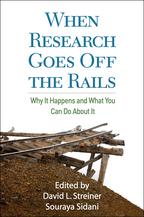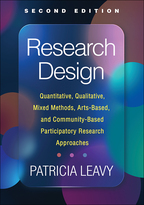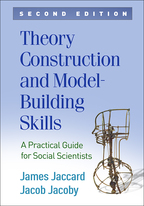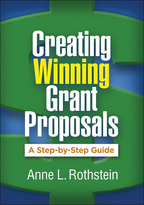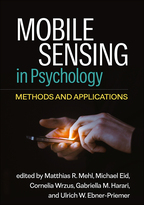When Research Goes Off the Rails
Why It Happens and What You Can Do About It
Edited by David L. Streiner and Souraya Sidani
Paperbacke-bookprint + e-book
Paperback
orderOctober 8, 2009
ISBN 9781606234105
Price: $57.00398 Pages
Size: 6" x 9"
Check out the detailed summary chart of the issues, methods and settings covered in each chapter.
“An eye-opening text that pushes the reader to think about solutions to real world problems that occur in the field as one performs research....An essential read for new researchers and will be thought-provoking for those in the field....As a graduate student new to the field, I found this book useful for exploring the realities of research....The text reads more like a novel than a traditional scholarly text, which is a welcome addition to the reading list of most doctoral students. This text would be excellent material to pair with a traditional textbook for a research design course....Regardless of your position, social researchers will find the honest discussion of research problems and solutions to be an enlightening and interesting read.”

—Canadian Journal of Program Evaluation
“This unique, thorough guide offers inspiring testimony about how to persevere in the face of unexpected setbacks when designing or implementing a study. Contributors describe the untold story of research—the real-world intrusions that almost never make it into the publication of record. Topics include the ethical review process, recruitment contingencies with formal and informal gatekeepers, missteps in data collection and analysis, roadblocks and detours when implementing the study, and conflicts and personality factors associated with collaboration and intervention. The cautionary yet inspiring vignettes will resonate with experienced researchers and will appeal to graduate students just learning the ropes. This text will enliven a standard research methods course with a wonderful collection of stories from the front lines.”

—Gregory J. Meyer, PhD, Department of Psychology, University of Toledo
“Most books for social and behavioral science researchers assume that faithfully following certain protocols will produce useful results. In contrast, this book shows that the unexpected almost always strikes. There is as much to learn from these real-world situations of research gone awry as from textbook examples of 'perfect' designs that lead to straightforward results. The underlying message of all of the chapters is that serious mishaps are best avoided by focusing on prevention. Drawing on diverse studies using different designs in multiple disciplines, the book illustrates broadly applicable approaches to navigating the vicissitudes of research and evaluation practice.”

—Henry M. Levin, PhD, William Heard Kilpatrick Professor of Economics and Education, Teachers College, Columbia University; David Jacks Professor of Education and Economics (Emeritus), Stanford University
“Nobody told us this stuff! This is the information that is missing in graduate courses and professional texts on research methods, experimental design, and statistics. From distinguished interdisciplinary editors and contributors, this book fills an extremely important niche. It should be required reading for all graduate students considering a career in the health and social sciences. It will be extremely valuable to experienced researchers, knowledge brokers, and policy makers in the health and social service fields.”

—Charles E. Cunningham, PhD, Department of Psychiatry and Behavioural Neurosciences and Jack Laidlaw Chair in Patient-Centred Health Care, McMaster University, Canada
“In typical 'Streineresque' style, this book is easy to read, grounded in reality, and solution oriented. The contributors use accessible language, which makes reading the book feel like you are having an informal dialogue with colleagues. Social science researchers experiencing challenges at various stages of project implementation, graduate students who want to avoid and learn from mistakes made by others, and reviewers of grant proposals or manuscripts who are in a position to help others keep their research on track should seriously consider making this book a 'must read.'”

—Lucyna M. Lach, MSW, PhD, School of Social Work, McGill University, Canada
“This book is a useful reference that could help you anticipate potential problems when planning your thesis or dissertation study.”

—Amanda L. Garrett, graduate student, Department of Educational Psychology, University of Nebraska-Lincoln
—Canadian Journal of Program Evaluation
“This unique, thorough guide offers inspiring testimony about how to persevere in the face of unexpected setbacks when designing or implementing a study. Contributors describe the untold story of research—the real-world intrusions that almost never make it into the publication of record. Topics include the ethical review process, recruitment contingencies with formal and informal gatekeepers, missteps in data collection and analysis, roadblocks and detours when implementing the study, and conflicts and personality factors associated with collaboration and intervention. The cautionary yet inspiring vignettes will resonate with experienced researchers and will appeal to graduate students just learning the ropes. This text will enliven a standard research methods course with a wonderful collection of stories from the front lines.”
—Gregory J. Meyer, PhD, Department of Psychology, University of Toledo
“Most books for social and behavioral science researchers assume that faithfully following certain protocols will produce useful results. In contrast, this book shows that the unexpected almost always strikes. There is as much to learn from these real-world situations of research gone awry as from textbook examples of 'perfect' designs that lead to straightforward results. The underlying message of all of the chapters is that serious mishaps are best avoided by focusing on prevention. Drawing on diverse studies using different designs in multiple disciplines, the book illustrates broadly applicable approaches to navigating the vicissitudes of research and evaluation practice.”
—Henry M. Levin, PhD, William Heard Kilpatrick Professor of Economics and Education, Teachers College, Columbia University; David Jacks Professor of Education and Economics (Emeritus), Stanford University
“Nobody told us this stuff! This is the information that is missing in graduate courses and professional texts on research methods, experimental design, and statistics. From distinguished interdisciplinary editors and contributors, this book fills an extremely important niche. It should be required reading for all graduate students considering a career in the health and social sciences. It will be extremely valuable to experienced researchers, knowledge brokers, and policy makers in the health and social service fields.”
—Charles E. Cunningham, PhD, Department of Psychiatry and Behavioural Neurosciences and Jack Laidlaw Chair in Patient-Centred Health Care, McMaster University, Canada
“In typical 'Streineresque' style, this book is easy to read, grounded in reality, and solution oriented. The contributors use accessible language, which makes reading the book feel like you are having an informal dialogue with colleagues. Social science researchers experiencing challenges at various stages of project implementation, graduate students who want to avoid and learn from mistakes made by others, and reviewers of grant proposals or manuscripts who are in a position to help others keep their research on track should seriously consider making this book a 'must read.'”
—Lucyna M. Lach, MSW, PhD, School of Social Work, McGill University, Canada
“This book is a useful reference that could help you anticipate potential problems when planning your thesis or dissertation study.”
—Amanda L. Garrett, graduate student, Department of Educational Psychology, University of Nebraska-Lincoln

